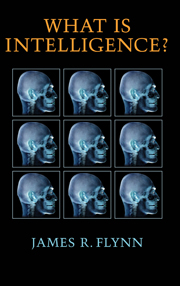Book contents
- Frontmatter
- Contents
- List of figures
- List of tables
- List of boxes
- Preface to the expanded paperback edition
- Acknowledgments
- 1 A bombshell in a letter box
- 2 Beyond the Flynn effect
- 3 Towards a new theory of intelligence
- 4 Testing the Dickens/Flynn model
- 5 Why did it take so long?
- 6 IQ gains can kill
- 7 What if the gains are over?
- 8 Knowing our ancestors
- 9 The art of writing cognitive history
- 10 About GUT: the grand unification theory of intelligence
- 11 Howard Gardner and the use of words
- Appendix I Tables
- Appendix II Declaration in a capital case
- References
- Subject index
- Name index
Preface to the expanded paperback edition
Published online by Cambridge University Press: 05 August 2012
- Frontmatter
- Contents
- List of figures
- List of tables
- List of boxes
- Preface to the expanded paperback edition
- Acknowledgments
- 1 A bombshell in a letter box
- 2 Beyond the Flynn effect
- 3 Towards a new theory of intelligence
- 4 Testing the Dickens/Flynn model
- 5 Why did it take so long?
- 6 IQ gains can kill
- 7 What if the gains are over?
- 8 Knowing our ancestors
- 9 The art of writing cognitive history
- 10 About GUT: the grand unification theory of intelligence
- 11 Howard Gardner and the use of words
- Appendix I Tables
- Appendix II Declaration in a capital case
- References
- Subject index
- Name index
Summary
I hope readers will find the three additional chapters in this edition helpful. Chapter 9 expands on the “Distinguished Contributor's Interview” of December 2007, given at the conference of the International Society for Intelligence Research in Amsterdam. That interview convinced some whose main concern is the measurement of intelligence that my history of intelligence is compatible with their work.
Chapter 10 amends some advice I give in Chapter 3 about how we might arrive at a comprehensive theory of intelligence. It clarifies the contribution of brain physiology. I owe Linda Gottfredson a debt for suggesting another clarification. MRI or magnetic resonance imaging (some readers might have assumed it was autopsy) revealed the fact that the brains of elite London taxi drivers had an enlarged hippocampus. I also wish to take this opportunity to acknowledge her contribution. I respect not only her right to conduct research into “sensitive problems” but also the quality of her research.
Chapter 11 is a reply to readers who have asked me what I think of Howard Gardner's theory of multiple intelligences. They will find that I share his values but am not convinced of the utility of his language. I owe Robert Sternberg a debt for noting that a reference to Gardner on page 50 became “Garber” by mistake (the mistake has been corrected).
Information
- Type
- Chapter
- Information
- What Is Intelligence?Beyond the Flynn Effect, pp. xiiiPublisher: Cambridge University PressPrint publication year: 2007
